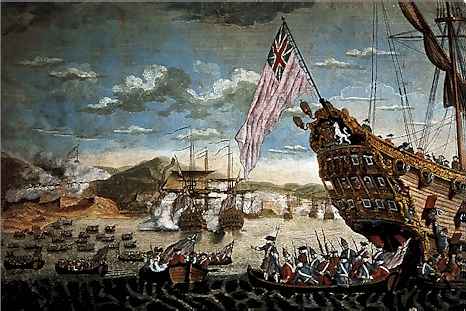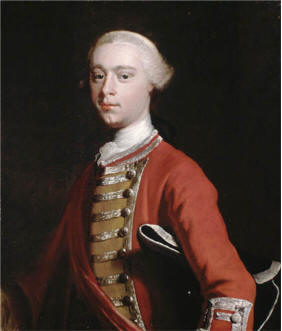
The year was 1782. The British empire was at war. The Minorca island had fallen. The Rock of Gibraltar was set to fall. And in the city of Paris,
three American negotiators (John Jay, John Adams, and Ben Franklin) gathered to settle peace terms.
Given particular instructions by Congress, the three set off to Paris. The three representatives chafed at the instructions given to them. They were told not to make any separate peace and to consult with their French allies at all stages of negotiations. The three could tell that the French foreign ministry had an indirect hand in the instructions.
France, on the other hand, had other things

on its mind. Promises were made to Spain that would give them Gibraltar. However, Spain wanted the
trans-Allegheny area as well. This put France in a tight spot since America was promised it as well.

France wanted an independent United States, but didn't want to deal with it. So France
forged a plan to keep America cooped up east of the Allegheny Mountains. Furthermore, it would be easier to promote French interests and policies in a tiny country than in a larger one. France payed money for its troops and now it wanted it back.

with the ambitions of Americans and Spaniards. He saw signs that would indicate France would betray them.
So, secretly, he broke the instructions given to them by Congress by telling the British of their troubles.

Through the Treaty of Paris (II), Britain finally recognized the
independence of the United States. Furthermore, extremely generous amounts of land were given to them including the Mississippi, the Great Lakes, and Florida. Also (to Canadian disapproval), fisheries in Newfoundland would still be theirs.

Why was all this land given to them? The answer is because Britain didn't want the Americans to succumb to their French allies and would do anything to lure them away from the French.
The war cost a lot for the French as well, including money, men, and making promises that it couldn't keep to the Spanish crown. So by ending the conflict, France was relieved to free itself from further debt and embarrassment.

 Was an income tax legal? Whether it was or not, Congress made it legal in 1913 with Amendment XVI to the Constitution. This Amendment directly made it legal for the government to tax part of a workers income.
Was an income tax legal? Whether it was or not, Congress made it legal in 1913 with Amendment XVI to the Constitution. This Amendment directly made it legal for the government to tax part of a workers income.


 Company treatment of its "most valuable assets" have not always been especially good. Sailors, for instance, were treated brutally from the days of
Company treatment of its "most valuable assets" have not always been especially good. Sailors, for instance, were treated brutally from the days of 



















